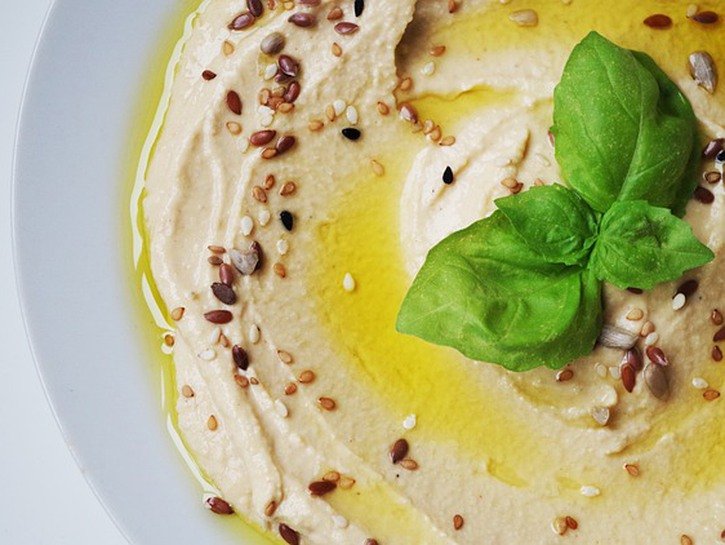Hummus is a well-known dip or spread that originated in the Middle East. It is generally comprised of chickpeas, lemon, garlic, tahini, salt, and olive oil, and has many inventive variations like roasted red pepper or edamame flavor. Hummus is a generally accepted healthier snacking option, but is it actually good for you? Is hummus truly healthy? We’ll break down this question and more in our hummus guide.
Hummus Basics

We’ll begin by exploring the nutritional profile of hummus and highlighting some of the popular types of hummus.
Nutritional Info
Hummus is naturally gluten-free, which makes it a great choice for those with that sensitivity. It’s also nutrient dense since it’s mostly made of chickpeas, one of the most popular pulses in the world. Hummus and chickpea consumption has been linked with higher fiber diets, as well as better levels of vitamin A, vitamin E, and vitamin C among regular snackers. Hummus also has an exciting triad of healthy food markers; it’s a great source of healthy fat, protein, and fiber. Plus, it offers another way to get calcium, folate, and magnesium into our diets. Hummus is also generally less processed and more natural than other snack options that contain a bunch of ingredients we can’t pronounce. Additional bonus? It even contains very little sugar per serving.

Types of Hummus
We’ve already covered what basic hummus entails, but there are so many more options to try. Some other popular flavors and combinations are sun-dried tomato, sweet potato, black bean, roasted red pepper, edamame, chipotle, eggplant, artichoke, and avocado just to name a few. Each of these flavors could present their own health benefits and detriments as well, so be sure to carefully review the nutrition information in each case. Read on for exactly how to ensure that you consume hummus in a healthy fashion.
The Trouble With Hummus

Now that we know what hummus is made of and some of its health benefits, let’s explore how it can become a snacking issue instead of a healthy option.
Portion Size
Like most snacks, the true issue that turns hummus from a harmless high protein treat into a problem is an inflated serving size. A couple tablespoons of hummus generally contains about 70 calories. That is perfectly acceptable for an afternoon snack, as long as you don’t overdo it and mindlessly consume more than intended. We recommend purchasing pre-portioned hummus from the store or measuring it out yourself before you start munching. If not, your “healthy” afternoon bite can quickly expand to include enough caloric content for a full meal.

What Goes Well With Hummus
One other issue that could arise with hummus is what vehicle you use with it. By vehicle, we simply mean what are you eating with your hummus? If the answer is cruciferous raw vegetables like broccoli, that’s the right choice. Vegetables offer a low calorie and high nutrient option to pair with chickpea dip. We especially love sweet red bell peppers, crunchy carrots, and mild cauliflower with a hummus platter. It should be noted that a more traditional hummus presentation would include cucumbers, olives, and tomatoes as well. A whole grain pita would be another healthy route. We do not recommend pita chips or white bread since those can easily add up to a higher calorie snack.

Store Bought Suspicions
One final way hummus could be a snacking problem is the high presence of sodium in some of the varieties available for purchase at your local grocer. You should aim for less than 80 milligrams of sodium for each serving size of roughly two tablespoons. Additionally, to avoid over-processing, read the hummus label carefully for ingredients that match the traditional recipe (chickpeas, olive oil, tahini, etc). That way, preservatives and sweeteners can’t sneak into your otherwise healthy snack. To fully avoid this issue, simply craft homemade hummus in your own kitchen with a food processor.

Other Uses For Hummus
We’ve already gone over how to use hummus as a vegetable or chip dip, but there’s so much more this Middle Eastern spread has to offer. We love using hummus instead of other less natural condiments on our favorite deli sandwich. We even enjoy a dollop of hummus instead of processed salad dressing, especially in a traditional falafel salad. Hummus can also be used as “sauce” on vegan no-bake pizza. Hummus as a healthier dessert option is another exciting possibility.

So overall, we have learned that hummus is a great option for a healthy snack when enjoyed carefully. For maximum nutrient boost, pair it with crunchy fresh vegetables, make your own hummus at home, and go easy on the portion size. Then you can enjoy this delicious and nutritious powerhouse, full of healthy fat, protein, and fiber. And it’s clear that the numerous flavors and uses for hummus are just the beginning of seamlessly incorporating this superfood into your healthy lifestyle. Bring on the hummus!
